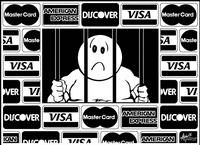 Today’s economic climate has created an opportunity for the “business savvy” to make money by preying on the poor. “Pay Lenders”, businesses that loan individual monies using their paycheck as collateral, are on the rise. These businesses charge high interest rates. In my opinion this is no more than a legalized version of loan sharking. The difference of course is that if you cannot pay you don’t have to worry about getting any bones broken, but you can possibly end up in jail. Our courts have felt the effect of budget cuts. As such they have become more focused on generating revenue in addition to their responsibilities as civil servants. Since the recession began, courts have increasingly had to fend for themselves by imposing fees on criminal defendants to address budget gaps. In Cambria County, Pa., for example, the Court of Common Pleas imposed 26 fees on a woman convicted of a drug crime, including $8 each for postage and judicial computers. In one State a $35 parking ticket ended up being $235 once all the fees were added. According to an article in the Huffington Post, incarcerating people for not paying fees that they can't afford isn't generating any government revenue -- it's just creating more government spending. For example, Rhode Island sent Ricardo Graham to prison for 40 days at a cost to the state of $4,000 because he couldn't pay $745. In the case of Pay lenders and the courts, unpaid debts are outsourced to debt collectors. These collectors tack on additional fees to the original amount owed. If the bill cannot be paid a creditor gets a civil judgment against the debtor. Then the creditor's lawyer calls the debtor to an “examination” in civil court, where they are asked about bank accounts and other assets the creditor might seize.
If the debtor doesn't show, the creditor asks the court for a “body attachment.” That's an order to arrest the debtor and hold him or her until a court hearing, or until the debtor posts bond. A debtors' prison is a prison for those who are unable to pay debt. Prior to the mid 19th century debtors' prisons were a common way to deal with unpaid debt. In 1833 the United States abolished federal imprisonment for unpaid debts, and most states outlawed the practice around the same time Six states (Arkansas, Arizona, Illinois, Indiana, Minnesota, and Washington) allow debt collectors to seek arrest warrants for debtors in default if all other collection methods have failed. Whether a debtor will actually be prosecuted or not varies from state to state, county to county, and town to town. The individual is taken into custody and is typically required to submit financial documentation to the courts (to facilitate seizure of assets or wage garnishment), although in some cases the individual may be held indefinitely until a payment plan is reached or the debt is paid in full, especially if the individual is insolvent. (Editor's note: On July 25th Illinois Governor Pat Quinn signed into law HB 5434, known as “The Debtors Rights Act of 2012,” which has among its provisions, banned the jailing of debtors who have missed a court mandated payment.) If you are in debt and cannot afford to pay the worst thing you can do is avoid it. You could end up with more fees or worse, end up in jail. |
EditorErnest R. Heyward is the Founder and President of the Marketplace for Social Awareness and Social Responsibility Inc. Categories
All
Archives
June 2020
|
MARKETPLACE FOR SOCIAL AWARENESS AND SOCIAL RESPONSIBILITY INC.



